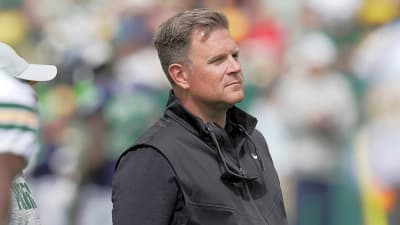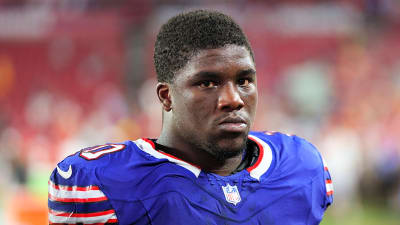
Daniil Medvedev was down match point to Benjamin Bonzi, grinding through one of those sticky New York nights that never seem to go smoothly. Then, prematurely a photographer casually strolled onto the court hoping to get a shot of the match winning point. It was something unseen and confusing, leaving the umpire, Greg Allensworth, to pause the point and give Bonzi a replayed first serve. That tiny, technical decision detonated something inside Medvedev.
The Russian’s eyes went wide, his arms flailed, and suddenly he was shouting, gesturing, ranting. For nearly six minutes the match froze in chaos as Medvedev barked at the chair, the fans jeered, and the tension in the US Open stadium turned electric. This wasn’t just frustration; it was a full-blown eruption.
And yet, in the strangest twist of all, he channelled that fury into something almost heroic. Down and nearly gone, Medvedev stormed back, stealing the third set in a tiebreak before blitzing Bonzi 6–0 in the fourth. For a moment, the meltdown looked like it might become one of those legendary US Open stories: the villain turned survivor, the man who screamed his way back into contention.
But reality doesn’t always script fairy tales. By the fifth set, the emotional fuel was spent. Bonzi steadied himself, Medvedev’s energy drained, and the Frenchman closed it out with three sets to two win. As the final ball sailed out, Medvedev smashed his racket repeatedly, the noise echoing around the arena.
Becker, Gilbert, Kyrgios react
Afterward, he tried to explain. The outburst, he insisted, wasn’t about the photographer, it was about the umpire’s ruling. “I was not upset with the photographer,” he said, voice ,“I was upset with the decision.” Maybe that’s true, but watching him combust on court, it looked like more than a single call. It looked like months of pressure, disappointment, and expectation boiling over in public view.
And the tennis world noticed. Boris Becker, never shy with an opinion, called it exactly what it looked like: “a public meltdown.” On social media he didn’t just criticize, he went further, suggesting Medvedev “needs professional help.” Coming from Becker, a man who knows both the glory and the pitfalls of life in the spotlight, the words landed hard.
Brad Gilbert, too, pointed to a pattern. Washington, Paris, now New York, Medvedev’s collapses weren’t isolated anymore, but part of a worrying trend. Patrick McEnroe weighed in from the ESPN desk, saying maybe the Russian should step away from the tour altogether, take the rest of the year off, and reset. That kind of advice doesn’t get thrown around lightly in tennis.
Not everyone joined the pile-on. Nick Kyrgios, who knows something about on-court blowups himself, fired back on social media with a simple defence: “Medvedev is the best.” For Kyrgios, the chaos was almost a badge of authenticity. He’s lived that space between genius and implosion, and maybe he sees a kindred spirit in Medvedev.
The photographer, meanwhile, became collateral damage. His credentials were revoked by the U.S. Tennis Association, the governing body insisting he had been warned not to step onto the court. The man later described feeling like he’d been “lynched” by the backlash, another bizarre subplot in a night already filled with theatre.
Strip away the noise, though, and the picture of Medvedev is complicated. He’s a former US Open champion, a man who once stood toe-to-toe with Novak Djokovic on this very stage and denied him a calendar Slam. But this year he’s looked adrift. Slam losses piling up, confidence fraying, emotions spilling out at the worst times. Watching him smash that racket, scream at the chair, soak up the boos, you wondered whether this was just one bad night or the symptom of something deeper.
That’s what Becker was hinting at when he talked about “professional help.” Not just a sports psychologist for a sharper focus, but perhaps someone who could untangle the bigger knots, expectations, pressure, frustration with himself. Tennis is lonely at the best of times; when the spotlight turns hostile, it can feel suffocating.
And yet, Medvedev is still compelling. Even in meltdown, he drew every eye, made every fan feel the pulse of the night. There are players who fade quietly into defeat; he does not. He burns, loudly, unapologetically, and in that fire, both brilliance and disaster live side by side.
For Bonzi, the victory was career-defining, a night he’ll never forget. But for Medvedev, the loss will linger differently. It wasn’t just about the score line, it was about the sight of a top player unravelling in real time, about the storm that follows when the human side of sport breaks through the polished surface.
When he left the court, his head hung low, racket ruined, the New York crowd still buzzing from the spectacle. Some cheered, some jeered, but everyone had witnessed something raw, unfiltered, unforgettable.
Daniil Medvedev has always played tennis like a man on a tightrope, swaying between genius and self-destruction. In New York, he fell, and he fell hard. The question now is whether this was just a stumble or a sign that the rope itself is fraying.
INSANE scenes in the Medvedev & Bonzi match at US Open
— The Tennis Letter (@TheTennisLetter) August 25, 2025
A cameraman was trying to leave after Bonzi missed his 1st serve.
The umpire gave Bonzi a 1st serve.
Daniil: “Are you a man? Are you a man? why are you shaking? What’s wrong huh? Guys he wants to leave. He gets paid by… pic.twitter.com/nzlqgoWxre
More must-reads:
- Oscar Piastri wins Dutch Grand Prix
- Texas' Arch Manning warned to 'calm down' after loss to Ohio State
- The 'NFL QB season rushing leaders' quiz
Customize Your Newsletter
 +
+
Get the latest news and rumors, customized to your favorite sports and teams. Emailed daily. Always free!








